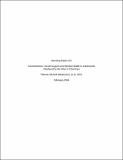Connectedness, Social Support and Mental Health in Adolescents Displaced by the War in Chechnya
Author(s)
Betancourt, Theresa Stichick
Download22_connectedness.pdf (216.0Kb)
Metadata
Show full item recordAbstract
This study presents an exploratory, cross-sectional investigation of factors associated with internalizing emotional and behavioral problems (anxiety/depression, emotional withdrawal, and somatic complaints) in a sample of adolescents displaced by the war in Chechnya and interviewed in the fall of 2000. Social support and connectedness with family, peers, and the larger community were given particular attention as potential protective processes explaining variation in internalizing mental health problems as measured by the Achenbach Youth Self Report (YSR) scale (1991). It was hypothesized that family, peer and community connectedness, and global ratings of social support would be associated with lower levels of internalizing mental health problems in this population. Findings indicated that, consistent with other studies of war-affected children, internalizing behaviors in this sample of displaced adolescents were higher compared to rates in samples published on non-war-affected Russian adolescents. Expected gender differences were observed, with girls reporting higher internalizing problems than boys. No differences by gender on social support or family connectedness were observed; however, males reported higher peer connectedness and community connectedness than did females. In multivariate analyses, family connectedness was indicated as an enduring and significant predictor of lower internalizing mental health problem scores upon adjusting for covariates and all other forms of support investigated.
Date issued
2004-02Publisher
Inter-University Committee on International Migration
Series/Report no.
Rosemarie Rogers Working Paper Series;22